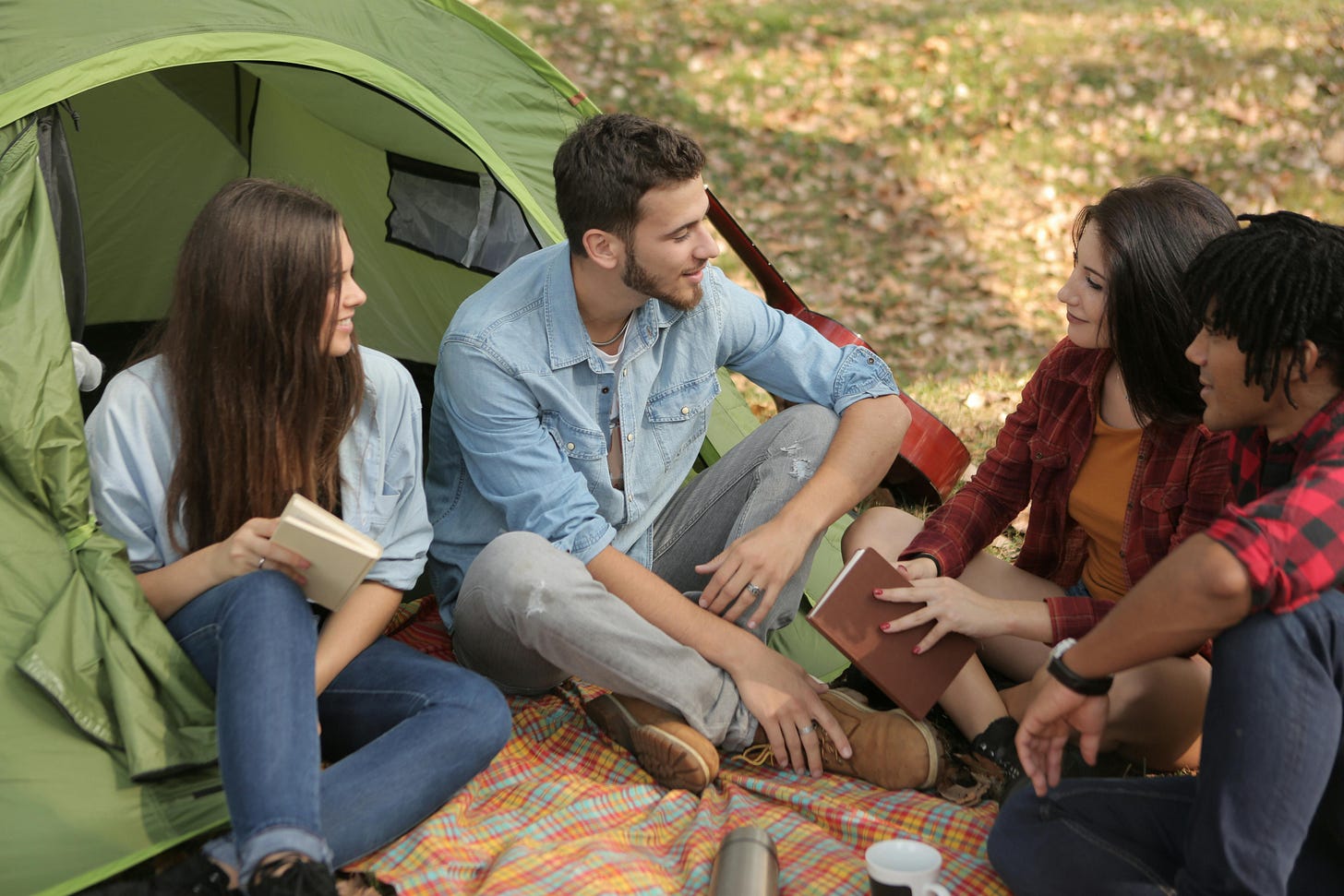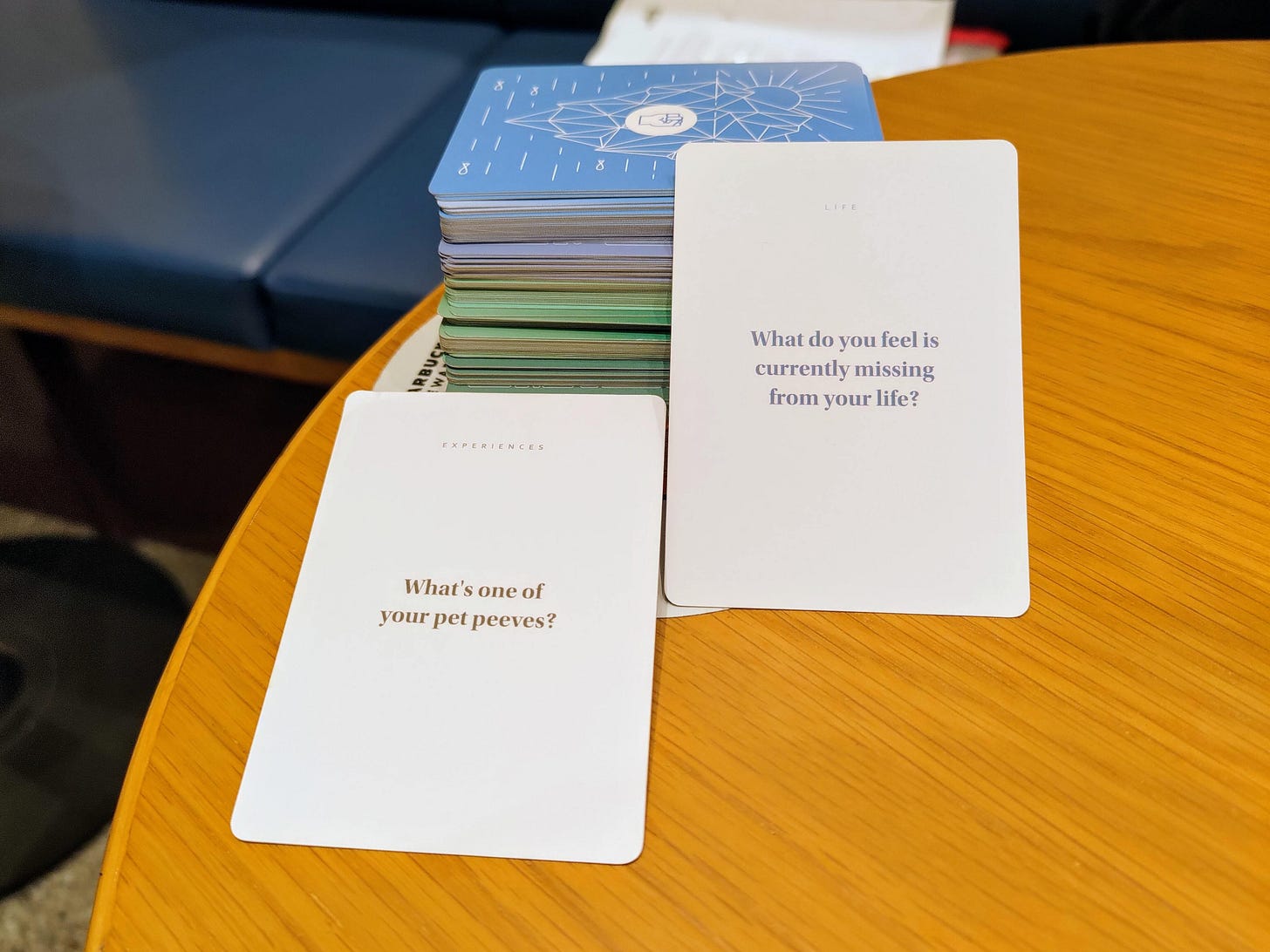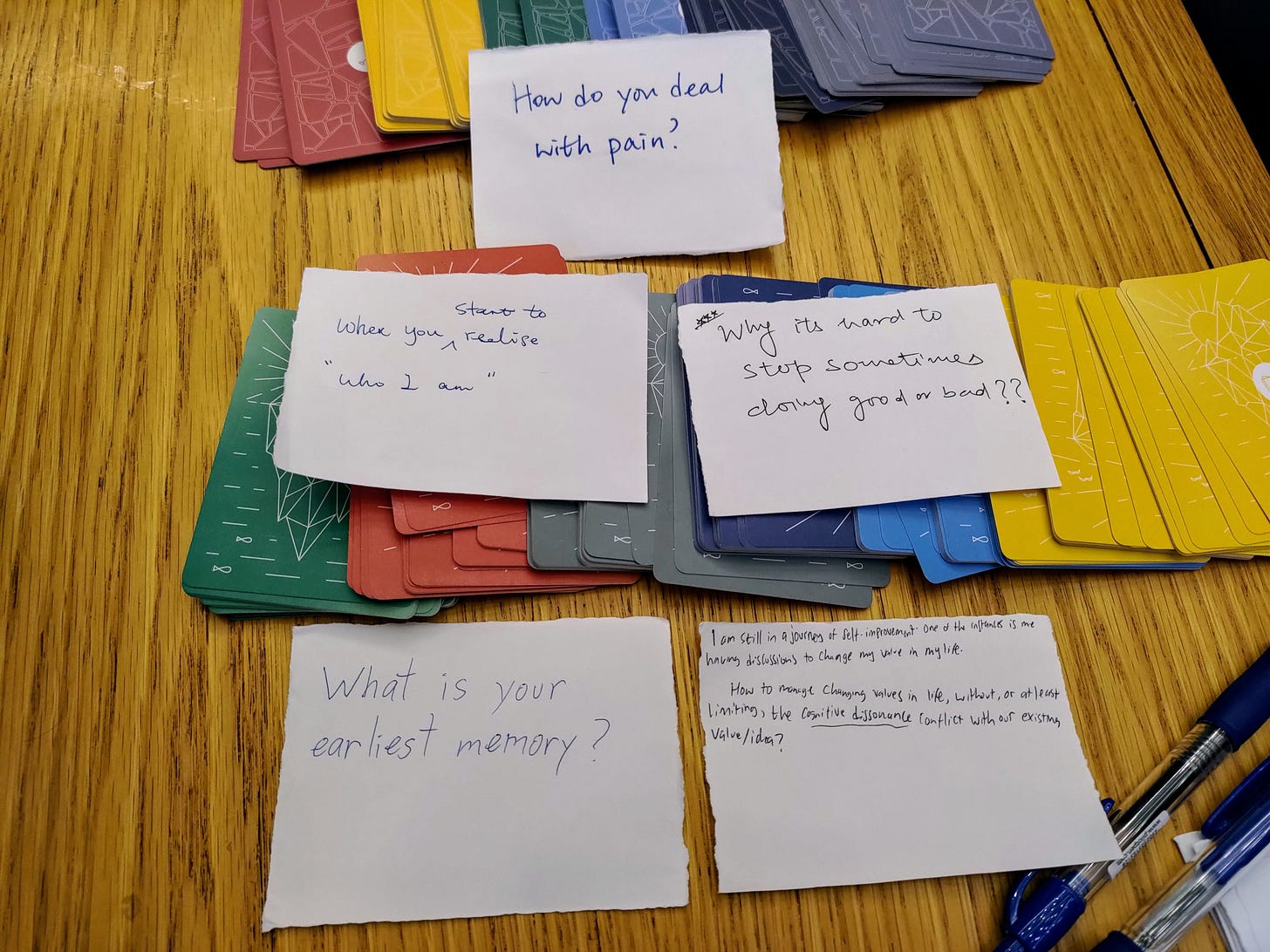Meaningful Events at Curious Souls Café
Welcome to the Curious Souls Café, where we create space for meaningful conversations, personal reflection, and shared experiences. Our events are centered around two rounds of discussion, designed to encourage connection and the exchange of ideas in a relaxed, inclusive atmosphere.
Where to find our events:
We’re currently hosting regular events most frequently in Hong Kong and Singapore, occasionally on Zoom.
Other regions we did in the past that currently don’t have regular meetings: Taipei and Kuala Lumpur.
In 2025, there are planned meetings in March in Shenzhen, and Macau, in April in Guangzhou and Shanghai, as well as in Osaka in May.
Event Structure
Our event format is continually evolving to better meet the needs of our participants. Below is the typical structure of a Curious Souls Cafe event. (We also offer flexibility to adapt based on specific group preferences.)
Initial Welcome and Introduction
The event begins with a warm welcome. The facilitator introduces themselves and explains the philosophy-cafe-style approach: casual, inclusive, and non-academic, where everyone feels comfortable contributing.
Facilitation Style: Our facilitators view themselves as guides rather than hosts. The aim is to foster a relaxed space where participants can freely explore ideas.
If it's your first time attending, you’ll receive a welcome leaflet or a link to view it online.

Two Rounds of Discussion
Each event consists of two rounds of discussion, carefully designed to balance structure and spontaneity:
Round One: Thoughtfully curated questions to encourage personal sharing and reflection.
Round Two: Participant-generated questions for deeper, organic conversations.
Note: This only describes our typical sessions. There may be sessions conducted in different ways that better suit the events or facilitators. For example, when we do not have enough time, we may end up with having just one round.
Round One: Curated Question Cards
The session begins with participants selecting from a deck of thoughtfully curated question cards. These questions aren’t random prompts; they’re intentionally chosen to spark meaningful reflection and discussion while steering clear of overly sensitive topics. The questions can be about the topic of the day or generic if there isn’t a theme for the meeting.
The primary goal of this round is to foster genuine connections through personal sharing. Additionally, it helps participants build rapport with one another and become familiar with the question format, preparing them for a more in-depth second round.
The decks we’ve found most suitable for this round include:
Big Talk (we are not affiliated with this product)
Best Self: Deeper Talk Deck (we are not affiliated with this product)
Question cards made by our facilitators
Curious Souls Café web app (access the live app through the link, or view its documentation here)
This round can be conducted in one of three styles. The facilitator will select the most appropriate option based on the group and the nature of the event.
Open Discussion
Paired Discussion
Random Reveal
Note: If you are using the app, picture each question on the app as a physical card, and follow the instructions for an engaging and seamless experience.
Style One — Open Discussion
In this style, participants are invited to draw three cards from the deck. Each card contains a question related to different categories.
Participants then select one question to present to the group for discussion. If none of the questions resonate, they may draw another set of three cards. (If there aren’t enough cards, participants should return two cards after drawing their initial three.)
The first person to arrive at the event is usually given the opportunity to throw a colorful dice to decide who begin the discussion with their chosen question. The person who selects the question answers it first, followed by others in turn. This structure allows participants time to reflect before responding. The question-asker decides which direction to pass the discussion (e.g., clockwise or counterclockwise). Participants are also free to pass if they feel uncomfortable answering.
If the group size is large (e.g., 8–15 participants), the discussion may only cover about few questions. In such cases, smaller breakout groups can be formed, especially if regular attendees are comfortable co-hosting.
Style Two — Paired Discussion
In this style, the facilitator presents the group with four cards, each containing a unique question. Participants independently select one card that resonates with them.
Afterward, participants pair up and discuss their chosen questions with their partners. This creates an opportunity for more personal and focused conversations.
Once the paired discussions conclude, participants rejoin the larger group to share their perspectives along with any insights or takeaways from their partner. This two-step process—intimate pairing followed by group sharing—helps balance depth and inclusiveness in the discussion.
Style Three — Random Reveal
With this style, the facilitator randomly reveals a few cards (e.g., four) from the deck at a time. Each participant selects one question from the four to answer.
After everyone has answered their chosen question, the group may engage in an optional discussion—either immediately after each participant's answer or once all participants have shared. Once the discussion concludes, the facilitator reveals a new set of four cards, and the process begins again.
This continues until the deck is exhausted or the session time runs out. This dynamic format keeps the energy high and ensures a variety of questions are explored throughout the session.
Each of these styles offers a unique approach to encouraging meaningful engagement and connection. The facilitator can adapt the style to best suit the group’s size, preferences, and goals for the session.
Round Two: Participant-Generated Questions
In the second round, participants take a more active role in shaping the discussion. After becoming familiar with the question format in the first round, this round is intentionally less structured, allowing for greater creativity and spontaneity.
Each participant writes down a question or topic they’d like to discuss on a blank piece of paper. These questions are inspired by their current thoughts, feelings, or experiences. Topics can vary widely—from personal dreams and challenges to recent experiences or ongoing struggles. Participants are also welcome to build on questions from the first round or select a question from the provided question cards if they need inspiration.
Once everyone has written their questions, the group takes turns sharing them, along with the motivations behind each one. After hearing all the questions, the group votes on which topic they would like to discuss first. The question with the most votes becomes the focus of the discussion.
In smaller groups: More questions can be explored within the given time frame.
In larger groups: Fewer questions may be discussed due to time limitations.
As with Round One, the person who posed the selected question starts the discussion by sharing their initial thoughts. From there, the rest of the group joins in, contributing their perspectives and insights to create a rich and meaningful conversation.
Note: If time runs out during the event, it may conclude mid-discussion—for example, after the voting process. Any unanswered questions will be addressed in a future session dedicated to questions in the past, where we will explore questions anonymously printed on a physical question card, or virtualized on our app. (Questions may be edited, paraphrased, or refined if needed.)
Moments of Truth
The event concludes with a 5–10 minute reflection session. Participants share their key takeaways, insights, or lessons learned. This final round allows for collective wisdom to emerge and helps cement the connections and ideas formed during the event.
Optional Photo
Participants have the option to take a group photo to commemorate the session.
Post-Event Free Talk and Networking
After the formal event ends, participants are welcome to:
Continue conversations informally or enjoy a meal together.
Join a region-specific WhatsApp, or LINE group to share afterthoughts, resources, and reflections.
An anonymized summary will sometimes be shared for sessions where key insights are identified. After the meeting, our facilitators and participants may reflect on the discussion and contribute to a summary or collaborative workbook based on their notes and observations.
This optional time is a great opportunity to deepen connections and keep the dialogue going.
Optional Suggestions for the Event
These are just optional ideas to consider. Feel free to adapt them as inspiration depending on the flow of our gathering:
At the End of Each Question:
If the energy feels unresolved, consider asking: “Does anyone have further thoughts or final reflections before we move on?”
Feel free to check in with the question asker: “Did this address what you were looking for, or is there anything else we missed?”
For the Voting Process:
Facilitators may mention that all curious souls’ questions are loved and appreciated, and that if we don’t choose a question for discussion, it will be saved for a future session.
Facilitators might choose to vote for all questions in the second round by default, as a gesture of support and love for everyone.
Question askers can be assumed to vote for their own question by default.
Everyone can vote multiple times.
If time runs short, the voting process may be skipped. Still, participants can share their motivations behind their suggested questions. These questions will be revisited in future sessions..
Set a Reminder:
If it feels helpful, facilitators might use an alarm clock or timer to gently remind themselves of time-sensitive aspects, but only if it fits naturally within the flow of the event.
More Tips for Facilitators
Prepare by selecting a deck of curated question cards that align with the session’s theme.
Encourage participants to share openly while respecting their boundaries.
Consider using color-coded or leveled question cards to gradually guide the group from lighter topics to deeper reflections.
Make Your Own Question Cards
Facilitators may also tailor-make question cards by themselves to fit the topic of the events they host. For example, the questions can be categorized into multiple levels:
Level One: Easiest questions to ease participants into the conversation.
Level Two: Moderately challenging questions.
Level Three: Deep, thought-provoking questions.
Level X: Experimental questions that don’t fit into the category but were added for some reason.
This stratification allowed participants to begin with less demanding topics and progress to more profound ones if they chose to. The color-coded cards corresponded to their difficulty, with lighter colors indicating easier questions.
The Dice Decides
Sometimes, we may use a dice (either a physical or a virtual one, e.g., the virtual dice on our web app) for deciding which question cards participants have start first, with punishment options, hoping to make it more fun:
🔵 Blue: Pick anyone with a question from the blue deck (e.g., questions related to mindfulness) to initiate a group discussion, including yourself.
🟡 Yellow: Pick anyone with a question from the green deck (e.g., questions related to happiness) to initiate a group discussion, including yourself.
🔴 Red: Pick anyone with a question from the red deck (e.g., questions related to love relationships) to initiate a group discussion, including yourself.
Other colors (examples of things that can be done):
Punishment: Randomly pick a question from the pool and answer it yourself. (If the question doesn't suit you, you have one chance to pick another card.)
Punishment (Alternative): Randomly pick a question from the pool and pick a participant next to you to answer it. (If the question doesn't suit them, you have one chance to pick another card.)
Facilitator's Choice: The facilitator can decide what to do.
Note: These rules are flexible and can be adjusted according to the meeting requirements.
Curious Souls Café aims to foster a collaborative and reflective environment, where individuals engage in a process of shared experience, dialogue, and reflection, and are invited to share perspectives to create meaning and build connections.
To explore further what our events are like, you can browse some of our past meetings archived at curioussoulscafe.substack.com/archive.
For any questions, reach out to us at curious.souls.cafe@gmail.com 😊






